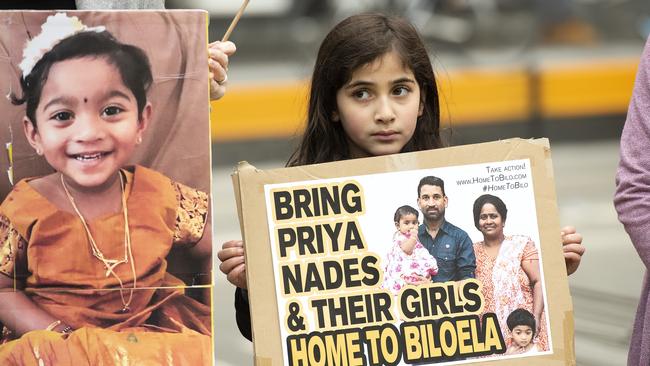Please, send this family home to Biloela

These ordinary Australians first heard the cries for help when SIEV-221 broke apart in rough seas in front of their homes in the early hours of December 15, 2010.
They tried to throw life jackets into the water, only to have the wind blow them back. Some tried to go into the water on their own vessels, only to realise the swell was too large. They watched helplessly as people drowned metres away. One woman told me that as her husband prepared to enter the water she stopped him by saying he needed to think about his children and what would happen if he drowned. She said she was still racked with guilt wondering if she did the right thing. A man told me that when the sea swelled, as it did that day, he got tense and heard the distressed cries from the people dying.
These locals praised the Royal Australian Navy for saving 42 lives, but they lived with the horrible memories of watching 48 people drown. Christmas Island residents know more than any other Australians the terrible consequences when people smugglers freely operate their evil trade. They know border control is necessary. Every day they see Australian Border Force planes and boats patrolling the seas and understand the importance of the job they are doing. These locals don’t want the tragedy of SIEV-221 to happen again.
Yet this same group of people is among the strongest supporters of returning the Tamil family held in immigration detention on Christmas Island to their regional community in Biloela in central Queensland. They know the family through the local school and church. These locals provide a point of view that we should hear.
We do need strong border control, absolutely. Regional processing, boat turnbacks where safe to do so and regional resettlement are fundamental to strong border controls — and I support all three measures. I am also frustrated that the government is falling behind on its future maritime surveillance capability upgrade, promised by Peter Dutton in 2018, still not delivered and no funding allocated in the budget forward estimates. Instead, last year the Morrison government rolled over a contract with Cobham Aviation for its Dash 8 planes.
Cobham planes have served us well in the past, but this equipment is a far cry from the drones, unmanned aircraft, underwater surveillance and other modern technology that Dutton promised to patrol the borders.
One of the Christmas Island residents asked me how it was the government had spent $50m so far in detaining and attempting to deport the Biloela family. The cost seemed astronomical to a community that lacked basic services — aged care, disability services, reliable freight or internet — and they couldn’t understand how spending $50m to deport and detain the Biloela family was a good use of taxpayer money. I said sometimes a government kept taking a decision based on precedent, or stubbornness, and ended up years later still defending a costly and irrational position.
Cost to the taxpayer alone would be a good reason for new Home Affairs Minister Karen Andrews to exercise ministerial discretion and allow the Biloela family to stay in Australia.
The family — Nades, Priya and their two Australian-born girls — is loved by their regional Queensland community. They enjoy bipartisan support from politicians, including Coalition figures such as Barnaby Joyce, Julie Bishop, Michael McCormack and Tony Abbott. Celebrities from Alan Jones to Michael Caton support them.
When I met the family I was struck by the girls’ little Aussie accents and bright, engaging smiles. They loved the toys and books I brought them, and they were excited to give me a beaded necklace in return. However, Priya was clearly lonely and depressed in detention. Even as we sat in a sterile visitors room in the detention centre, it was clear she loved being around people. During our visit she spoke often of her desire to go home to “my community in Bilo”, where she was involved in local church groups and volunteered at the local hospital. She told me she didn’t want anything from the government except a chance to work and raise her family.
Nades was the quieter of the two, but I sensed a profound sadness when he spoke. He had been tortured in Sri Lanka, he said. He worked two jobs in Biloela, volunteered at Vinnies and looked after his family. Now he was stuck in a situation he could not resolve.
Nades genuinely feared death if he was deported, but not because of what it would mean for him. Clearly, Priya and his two daughters were the centre of his life. He told me he just wanted to care for his wife and children, and he did not want to make his daughters orphans. It is a desire to which any father can relate.
Every year in Australia the ministers for immigration and home affairs make thousands of discretionary decisions under the Migration Act. Right now, the borders are closed, Australia’s refugee intake is exceptionally low, and there is a town in regional Queensland ready to welcome this family home.
Kristina Keneally is deputy leader of the opposition in the Senate, opposition spokeswoman for home affairs and opposition spokeswoman for immigration and citizenship.



On my third night on Christmas Island a group of local residents invited me around for drinks. We sat on the veranda overlooking the Indian Ocean, sipping gin and soda. It was all very nice, except for the topic — what it is like to live on the frontlines of the people-smuggling business.